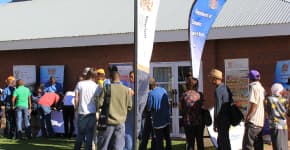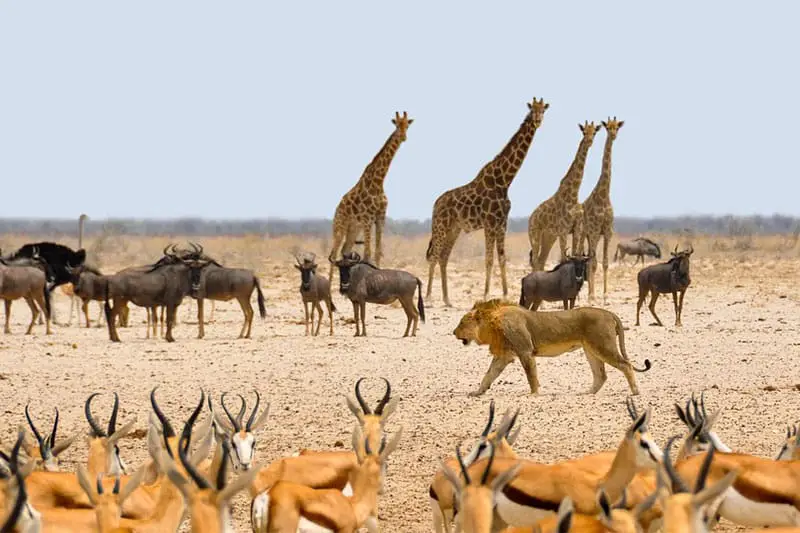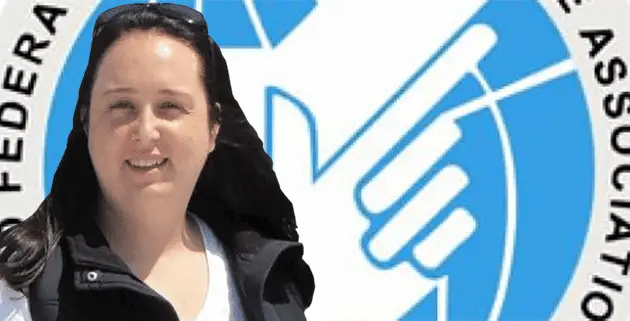How to Become a Tourist Guide in South Africa
Tourist guides in South Africa are some of the most important people in the travel trade. They interact on a personal level daily with tourists, and a good tourist guide can make a holiday visit really memorable. In this article, we investigate how to become a tourist guide in South Africa, what it takes to become a good tourist guide, resources for knowledge growth, and how and where to find work.
Note: Some of the information provided in this article may be affected by updates to the Tourism Amendment Bill 2019.
Who is a Tourist Guide?
Any person who, for monetary or other rewards, accompanies people who are travelling through or visiting any place within a country, and who furnishes those people with information or comments concerning a place or objects visited is defined as Tourist Guide. Many tourist guides may also wish to run their own tour operations in which they are both tour guide and tour operator.
Categories of Tourist Guides
There are three categories of tourist guides:
- Site Guides – these tourist guides have attained the minimum qualification in order to guide in a “limited geographical area” i.e. Hiking in the Drakensberg, visiting the Natal Battlefields, taking a day tour of Cape Town, visiting Soweto;
- Provincial Guides – are qualified to take tourists around an entire province i.e. Limpopo or Gauteng;
- National Guides – are permitted to conduct tours around South Africa, crossing all provincial boundaries. These guides would accompany people taking a comprehensive tour of South Africa, say, by coach.
Classification of Tourist Guides
- Adventure Guides – conduct a guided adventure experience e.g. rock climbing, paddling, abseiling, etc.
- Nature Guides – conduct a guided nature experience in areas such as Game Reserves, National Parks, nature conservation areas, trails, and the like.
- Cultural Guides – conduct a guided cultural experience in a limited geographical area such as a museum, community, wine farm, town or city.
Qualifications
Qualifications for tourist guides are governed by the National Qualifications Framework (NQF).
There are only two qualifications registered on the NQF:
- National Certificate in Tourism: Guiding (NQF2)
- National Certificate in Tourism: Guiding (NQF4)
Note that a new NQF 4 qualification has recently been registered and this replaces the 20155 qualifications.
Several unit standards, within the different areas of specialisation, have been clustered together to form skills programmes addressing areas of specialization, and aimed at persons wishing only to complete the specialized minimum area of learning required to guide.
These skills programmes are registered by CATHSSETA (The Culture Arts, Tourism, Hospitality and Sports Sector Education and Training Authority )for certification purposes. The applicable unit standards are registered on the NQF. In order to register as a site guide specialising in culture, nature, or adventure guiding you need different combinations of unit standards. These rules of combination can be accessed on the CATHSSETA website, at www.cathsseta.org.za.
To register as a provincial or national guide you need, as a minimum, qualification at NQF level 4 plus the required unit standard for your area of specialization – You can also view these on the CATHSSETA website as given above. Note that the requirements for guide registration, including what learning programmes or courses are needed for which category of guiding, is the competence of the Provincial Registrars of Tourist Guides.
Tourist Guiding Training and Assessors
All tourist guide trainers and assessors have to be accredited by CATHSSETA to be able to train according to the nationally recognized standards and qualifications network.
Assessors cannot issue certificates as they have to be working for/with an accredited training provider who will then issue certificates from CATHSSETA, upon completion of the assessment. The duration of the course, course content, dates and time of training, and the fee structure are determined by each training provider.
The guiding qualifications are made up of a collection of unit standards or building blocks. Each unit standard represents knowledge that a person must have, specific to his profession. These unit standards were devised in close consultation with tourist guides and other stakeholders. Each guide will be assessed against these standards.
Tourist guides are free to choose any training provider or assessor to work with. Details of accredited tourist guide training providers and assessors are available on the CATHSSETA website at www.cathsseta.org.za or can be obtained by calling their offices on 011 217 0600 or sending an email to info@cathsseta.org.za.
Recognition of prior learning (RPL) is the type of assessment used for those who have been working as unregistered guides in the past as it takes into account all the qualifications, work experiences, life skills etc. for a particular guide and fits these into the current NQF for guiding. The assessor may point out the areas/unit standards to which extra attention needs to be given. Once the tourist guide has completed this a meeting with the assessor will need to be arranged in order to complete the assessment.
The Registration Process
No tourist guide may work without being registered.
| NB: CATHSSETA does not register tourist guides. CATHSSETA gives accreditation to training providers so that they can train guides. |
According to the Tourism Second Amendment Act no 70 of 2000, any person who wishes to be registered as a tourist guide must apply to the relevant Provincial Registrar (refer to the list at end of this article).
In order to be registered as a tourist guide in South Africa, a person must meet the following minimum requirements:
- be a South African citizen or be in possession of a valid work permit;
- must have undergone training with a CATHSSETA-accredited training provider or any other accredited institution which offers programmes recognized by SAQA;
- be in possession of a valid first aid certificate from an institution recognized by the Department of Labour;
- pay a registration fee of R240 (Renewable every 3 years)
- submit 4 passport-size photos;
- must submit a completed and signed a registration form and the code of conduct and ethics upon registration.
Proof of Registration
The old SATOUR badges and ID cards became null and void on 31 May 2002. Registered tourist guides are now identified by new ID cards which all tourist guides are required to have in their possession whilst guiding.
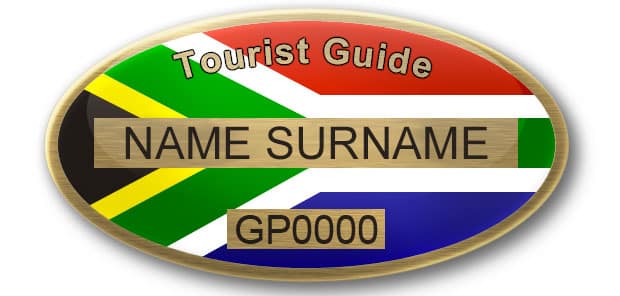
Official tourist guide badges must also be worn whilst guiding. The Provincial Registrar will issue badges and ID cards to new guides only once their application for registering as a tourist guide has been approved.
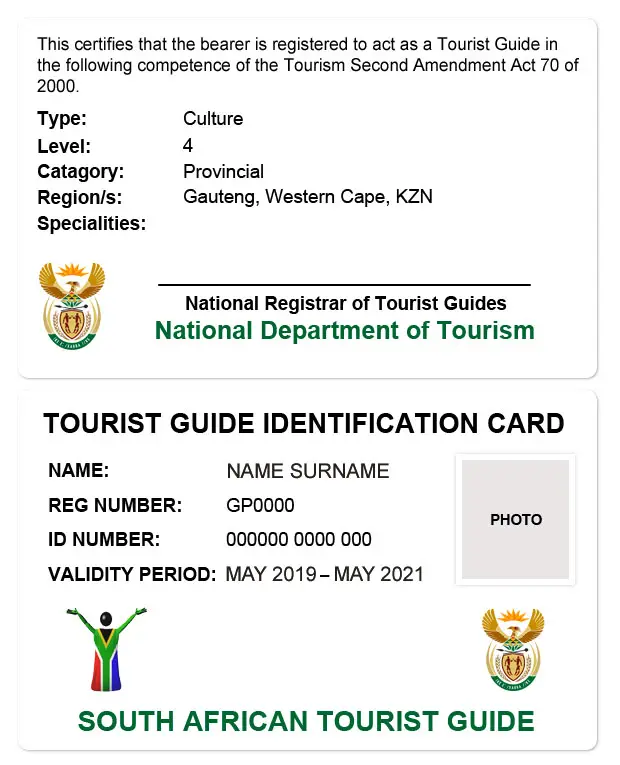
The ID cards indicate the category of guiding, the regions for which the tourist guide was found competent to guide, as well as specialities that the guide might possess. The ID cards are very important because the various policing authorities will request tourist guides to produce these during tourist guide spot checks conducted at various parts of South Africa to identify illegal/unregistered tourist guides.
Renewal of Registration
Any person registered as a tourist guide, may before the end of the period for which he/she is registered, apply to the Provincial Registrar for renewal of his or her registration and his/her registration shall, upon submission of application forms and other documents and the payment of R240, be renewed. For a full list of Provincial Registrars refer to the table at the end of this article.
Non-compliance
Failure of a tourist guide to complete the NDT registration and CATHSSETA accreditation process but continuing to guide will result in that tourist guide being liable for prosecution. Fines of up to R1 000 can be imposed on illegal guides. Operators found to be using illegal guides can be fined amounts up to R10 000. The process for lodging complaints about unregistered/illegal guides as well as registered/legal guides are outlined in the Second Tourism Amendment Act, 2000. Copies of these can be obtained from NDT offices or from any of the Provincial Registrars’ offices.
Tourist Guide Code of Ethics
A Professional Tourist Guide must conform to the Tourist Guide Code of Ethics. The code states that a guide:
- Shall be welcoming and demonstrate an enthusiasm for South Africa.
- Shall at all times show a willingness to provide optimum support and quality service to all tourists, and will give tourists an opportunity to enjoy or visit the desired destination.
- Shall in no way discriminate in rendering service to any tourist on any basis, e.g. race, gender, ethnicity, nationality, physical challenge, age, etc.
- Shall be impartial, unbiased and positive, and represent South Africa objectively.
- Shall be suitably dressed and presentable at all times.
- Shall be punctual, reliable, honest, conscientious and tactful at all times.
- Shall be a responsible driver, when driving as a guide.
- Shall carry out the programme/itinerary of a tour to his/her best abilities and be loyal to the company/organization that he/she is representing.
- Shall deal with conflict in a sensitive and responsible manner.
- Shall report any incident of injury or death to a nearby tourist authority or a police station.
- Shall be knowledgeable and shall assist tourists and not provide them with misleading information.
- Shall in the event of not being familiar with, or being unable to provide the information requested by a tourist, consult with the appropriate authorities for assistance.
- Shall at no time be under the influence of alcohol or a narcotic substance while on duty and shall refrain from administering any medication to a client without proper medical consultation.
- Shall never solicit for clients or gratuities.
- Shall be concerned at all times for the safety of the tourist.
- Shall wear the appropriate tourist guide badge and will carry his/her registration card.
- Shall treat all people, cultures and the environment with respect.
How to Find Work as a Tourist Guide in South Africa
Becoming qualified as a registered tourist guide is just the start. To find work, you’ll need to market yourself to tour operators and other employers. Of course, your contact details will appear in the National Database and relevant provincial tourist guide association websites (many of which you will have to join and pay annual membership fees).
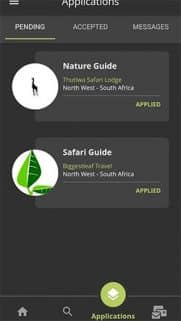
However, the best way to be found by Tour Operators and contracted for work is by downloading the RecruitAGuide App and creating your profile and video CV on recruitaguide.co.za. Employers want to know “who” you are and not just “what” you do, which is what your video CV helps them to see. RecruitAGuide also gives YOU the choice to either actively apply for jobs through your job board, or create the perfect profile and let job offers come to you. And best of all, there are no costs involved!
GUIDE ASSOCIATION LINKS:
- World Federation of Tourist Guide Associations
- National Federation of Tourist Guides and Affiliations
- Cape Tourist Guides Association
- Field Guides Association of Southern Africa
- Gauteng Guides Association
- KwaZulu-Natal Tourist Guides
- Nelson Mandela Bay Tourist Guide Association
- Battlefields Region Guides
Conclusion
Tourist guides are the ambassadors of South Africa’s tourism industry. They are often the first, and invariably the last, person that tourists come into contact with and are therefore responsible for creating lasting impressions and fond memories of the country.
This being the case, are tourist guides remunerated in accordance with their importance in the tourism value chain? Many tourist guides say that they are not, but some Tour Operators argue that a tourist guide’s remuneration should be in proportion to his or her knowledge, experience, qualifications and aptitude.
KNOWLEDGE RESOURCES FOR TOURIST GUIDES
How to become a South Africa Specialist
As mentioned in the above conclusion, if you want to improve your earning potential, then it makes sense to increase your knowledge about the country’s tourism attractions. To help you with that, South African Tourism has created the SA Specialist website. This is an interactive online learning programme that will improve your knowledge of South Africa by providing you with the knowledge and skills to better ‘show & tell” (or sell) South Africa as a tourist destination.
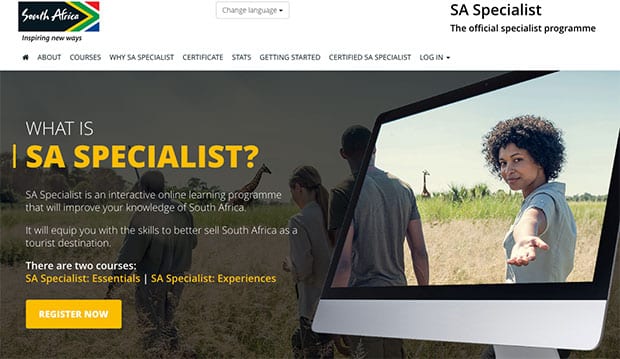
The SA Specialist features include:
- A free module-based online learning experience
- Packed with info about South Africa and its attractions
- Easy to use, with a user-friendly guide to help you along the way
- Study in your own time, when it suits you.
- On completion of the course/s, you will receive branded certificates and be able to use the name ‘SA Specialist’ or ‘South African Travel expert’, and market yourself as a specialist on South Africa.
There are two courses: SA Specialist: Essentials and SA Specialist: Experiences.
Practical Manual for Tourist Guides
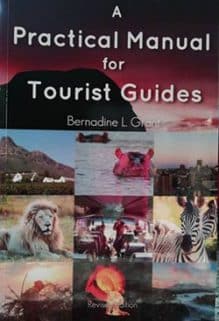
First written in 1982, the content of this practical manual has been updated and revised by the author of this unique book, Luanne Grant. Readers will gain a wealth of knowledge as Luanne draws on her enormous experience to offer a variety of invaluable information for the next generation of tour guides, tour operators and people working or planning to work in related fields. This original, useful and practical book captures the essential ingredients of the art of being a host and ambassador for South Africa.
From day trips, to long trips; Bus and walking tours; Driver Tours; registrations and qualifications – Grant has called on her extensive Tour Industry knowledge, as well as a wide variety of highly experienced Tourist Guides; thus ensuring that the content, the tips, and the values result in both local and global tourists returning home and telling the world about their fantastic experience.
You may be a qualified guide. You’ve studied how to research, plan and lead a tour group around, but do you have the hands-on experience of all the diverse kinds of tours? Do you know how to deal with tourists in various locations and with different problems? If your answer to these questions is “no” or “maybe”, then this book is for you. Even if your answer is “yes”, this book is still for you if you want to be an exceptional guide, professional, competent, and prepared for anything, with the tools to improve your voice and delivery.
List of South African Provincial Registrars’ Contact Details
Note: This was last updated on 13 May 2019 from information on the South African Department of Tourism website – Editor.
1. Limpopo
Department of Economic Development, Environment and Tourism
Registrar: Moses Ngobeni
Tel: (015) 293 8510
Cell: 082 800 2666
Fax: (015) 291 1085
Postal: P/BAG X 9486, POLOKWANE, 0700
Email: NgobeniM@ledet.gov.za
2. Mpumalanga
Mpumalanga Tourism and Parks Agency
Registrar: Musa Mahlangu
Tel: (013) 759 5487
Fax: 086 603 6766
Postal: P/BAG X 11338, NELSPRUIT, 1200
Email: makindes@mtpa.co.za
3. Gauteng
Gauteng Tourism Authority
Registrar: Mbuyi Kona
Tel:(011) 085 2101
Fax: 086 609 3941
Postal: P.O. BOX 155
Email: Mbuyi.kona@gauteng.gov.za
4. KwaZulu-Natal
Department of Economic Development and Tourism
Registrar: Peggy Dlamini
Tel: (033) 264 9324 / 264 9323
Cell: 082 952 7575
Fax: (033) 264 9316
Physical Address: 217 Burger Street, Calder Street, PMB, 3201
Email: dlaminipe@kznded.gov.za
5. North West
Department of Economic Development, Environment, Conservation and Tourism
Registrar: Adv Makinde
Tel: (018) 387 7883 / 387 7801
Cell: 082 674 1788
Fax: (018) 387 7886 / 387 7924
Postal: P/BAG X 15, MMABATHO,2735
Email: smakinde@nwpg.gov.za
6. Eastern Cape
Eastern Cape Parks and Tourism Agency
Registrar: Mbulelo Siyo
Tel: (043) 364 2570
Fax: (043) 701 9642
Postal: P.O. BOX 18373, QUIGNEY, 5211
Email: Mbulelo.Siyo@ecpta.co.za
7. Western Cape
Department of Economic Development and Tourism
Registrar: Leigh Pollio
Tel: (021) 483 8734 / 483 9130
Fax: (021) 483 2957
Postal: P.O. BOX 979, CAPE TOWN, 8000
Email: registrar@pgwc.gov.za
8. Northern Cape
Department of Economic Development and Tourism
Registrar: Andries Mokgele
Tel: (053) 830 4875 / 830 4881
Cell: 084 689 7251
Fax: (053) 831 3530
Postal: P/BAG X 6102, KIMBERLEY,8300
Email: amokgele@ncpg.gov.za
9. Free State
Department of Economic Development, Tourism and Environmental Affairs
Registrar: Mfundo Ngcangca (Acting)
Tel: (051) 400 9598
Cell: 082 773 8275
Fax: (051) 400 9590
Postal: P/BAG X 20801, BLOEMFONTEIN, 9300
Email: Mfundo@edtea.fs.gov.za
10. National Department of Tourism
Postal: P/BAG X424, PRETORIA, 0001
National Registrar: Morongoe Ramphele
Tel: (012) 444 6552
Fax: (012) 444 7090
Email: mramphele@tourism.gov.za
Information compiled with acknowledgement to Adventure Qualifications Network and the South African Department of Tourism – Tourist Guiding.

